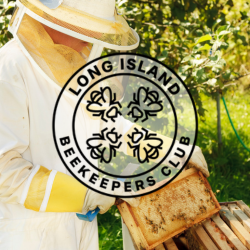
A certified Master Beekeeper buzzed into our library ready to chat about bees, pollinators and gardening.
June highlights pollinators and native plants for our year-long sustainability challenge. This month a professional in the apiculture field was interviewed to provide you, our patrons and readers, unique beekeeping insight.
Grace Mehl, of Smithtown, started as an accidental beekeeper in 2011. A friend’s request to keep a beehive on Mehl’s property got Mehl involved with the process. The simple favor quickly turned beekeeping into a beloved hobby.
Now over a decade later, Mehl completed the Eastern Apicultural Society’s Master Beekeeper certification program and maintains 14 hives on her four acres. Her dedication combined with busy honey bees produced over 1,000 pounds of honey for harvest last year alone.
Mehl serves as the Education Director for the Long Island Beekeepers Club to help other beekeepers train and learn. Club meetings are located at 1725 Brentwood Rd, Brentwood, NY 11717, on the property of the Sisters of St. Joseph where they have a teaching apiary. Meetings are open to anyone interested in beekeeping.
The Long Island Beekeepers Club (LIBC) started in 1949 by a group of beekeepers who wanted a network to socialize and support each other. It has since grown to about 350 members with an educational mission to teach beekeepers suburban honey bee management and the public the importance of honey bees, according to the LIBC website.
Each year the club offers at their apiary a beginner beekeeping class in January and teaching sessions during the warmer seasons. The guided interactions with honey bees can help people decide if beekeeping is for them.
Beekeeping is not the only way to help save the bees. Mehl shared three simple tips people can follow to care for pollinators from their yard.
Plant native plants for native bees and pollinators.
Pollinators other than honey bees matter too. These include bats and hummingbirds. Researching to find what flowers and trees are native to your area can help our native pollinators flourish.
Do not clean up everything in your fall garden.
When preparing your garden for winter, make sure to leave some sticks, foliage, or a small compost pile in your garden to give bees a place to lay their eggs.
Be mindful of pesticide use.
Avoiding pesticides is ideal, but if you use pesticides keep it at a minimum. Try spraying the pesticides at night when the bees are not flying and do not spray directly on your plants. Mehl suggests waiting until the plant’s petals have dropped to spray.
It is important potential beekeepers understand the reality of beekeeping and three common misconceptions. These are the space requirements, initial starting price and the honey harvesting timeline.
A quarter acre of land is enough for two hives in a suburban setting, Mehl said. Two hives are suggested with suburban beekeeping in case one hive fails or struggles with their queen. Honey bees must be registered with New York State through the New York State Department of Agriculture and Markets.
Mehl said that beekeeping generally costs $2,000 to begin. The price to purchase the honey bees, equipment and other materials for two hives is about $1,000. Honey harvesting equipment can be as much as another $1,000.
Materials include the beekeeper’s protective gear like a jacket, zippered veil and gloves that will need replacing based on wear and tear. Mehl laughed when asked about bee stings. She said that while the gear helps, getting a daily bee sting is still possible and likely.
The beekeeping season starts in April with the main honey flow happening in early spring to early summer. New beekeepers should anticipate a two-year wait before honey is available for harvest as honey bees first need to develop their hive, colony and use initial honey supplies to survive the winter.
Bottling and consuming local honey on Long Island does have its benefits. Tested local honey has revealed only trace amounts of pesticides as honey bees favor collecting nectar and pollen from flowers at the tops of tall trees where pesticides are not sprayed, Mehl said.
People have also shared stories about how local honey has helped alleviate their seasonal allergies as it is made with the pollen in their area, Mehl said. Bees will travel from their hive up to three miles in any direction, creating honey that reflects local plant and tree pollen.
The most important takeaway from the chat with Mehl is about responsible beekeeping. If you decide to start beekeeping it means caring for your hives and committing to their maintenance.
“If you are going to be a beekeeper, you must be a good one,” Mehl said.
Beekeeping requires hard work and effort, but it has a sweet reward. Whether you decide to explore beekeeping or gardening, try to keep our native plants and pollinators in mind. The South Huntington Public Library has relevant books, resources and ready library staff here to help.
For more information about the Long Island Beekeepers Club go to longislandbeekeepers.org.
Last Modified December 18, 2025